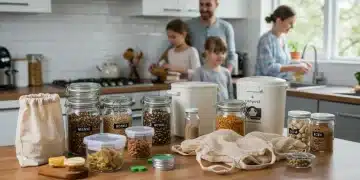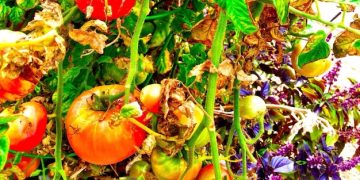Reduce Food Waste: 5 Smart Strategies to Save Money and the Environment
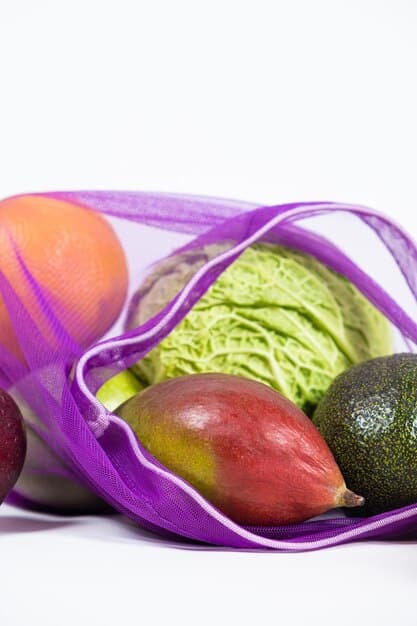
Reduce food waste with these 5 effective strategies, saving money and making a positive environmental impact through smart shopping, proper storage, creative cooking, composting, and meal planning.
Want to reduce food waste, save money, and help the environment? It’s easier than you think! Check out these five simple strategies.
Smart Shopping Habits
One of the most effective ways to reduce food waste is by adopting smarter shopping habits. Planning ahead and being mindful of what you already have can significantly decrease the amount of food that ends up in the trash.
By making small adjustments to your shopping routine, you can save money and contribute to a more sustainable lifestyle.
Plan Your Meals
Meal planning is a game-changer when it comes to minimizing food waste. By planning your meals for the week, you only buy what you need, reducing the likelihood of excess ingredients going bad.
Make a List and Stick to It
Once you have your meal plan, create a shopping list based on the ingredients you need. Sticking to your list helps you avoid impulse buys that often lead to food waste.
- Check your pantry and fridge before shopping to avoid buying duplicates.
- Organize your list by grocery store sections to streamline your shopping trip.
- Consider using a digital shopping list app to keep track of what you need.
In conclusion, adopting smart shopping habits significantly contributes to reducing food waste. By planning meals and creating shopping lists, you can avoid unnecessary purchases and make the most out of your grocery trips.
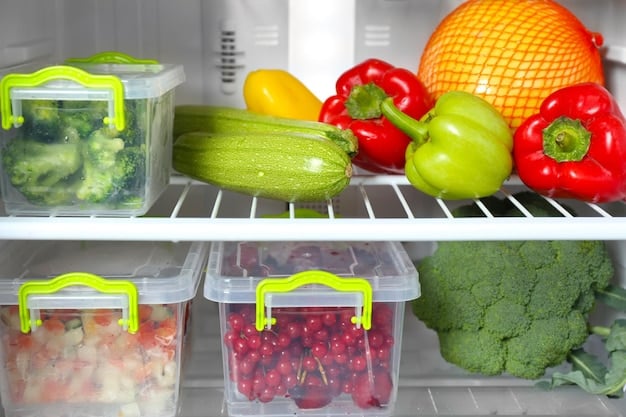
Effective Food Storage Techniques
Proper food storage is crucial for extending the shelf life of your groceries and preventing spoilage. Different types of food require different storage methods to stay fresh longer.
Investing a little time in learning and implementing effective storage techniques can significantly reduce the amount of food you throw away.
Understand Food Storage Needs
Each type of food has specific storage requirements. For example, some fruits and vegetables produce ethylene gas, which can cause other produce to ripen and spoil faster. Storing these items separately can help prolong their freshness.
Use Proper Containers
Storing food in airtight containers helps keep it fresh and prevents it from drying out or absorbing odors from the refrigerator. Clear containers also make it easier to see what you have on hand, reducing the chances of forgotten leftovers.
- Store leafy greens in a container lined with a paper towel to absorb excess moisture.
- Keep herbs fresh by trimming their stems and placing them in a glass of water, covered loosely with a plastic bag.
- Use reusable silicone bags or wraps for fruits and vegetables to maintain their freshness.
In summary, employing effective food storage techniques is vital for minimizing food waste. By understanding specific food storage needs and using proper containers, you can extend the life of your groceries and reduce spoilage.
Creative Cooking with Leftovers
Transforming leftovers into new, delicious meals is a fantastic way to reduce food waste. Instead of letting them sit in the fridge until they’re no longer appealing, get creative and repurpose them.
Creative cooking can not only minimize waste but also introduce variety and fun into your meal planning.
Plan for Leftovers
When preparing meals, intentionally cook a little extra with the goal of creating leftovers that can be used in new dishes. This simple step can save time and reduce the need to cook every night.
Get Creative with Recipes
Think outside the box and explore different ways to use your leftovers. Leftover roasted chicken can be turned into soup, sandwiches, or tacos. Cooked vegetables can be added to omelets, frittatas, or stir-fries.
- Use leftover rice to make fried rice or rice pudding.
- Transform stale bread into croutons, breadcrumbs, or French toast casserole.
- Blend leftover fruits and vegetables into smoothies or juices.
In conclusion, creative cooking with leftovers is an effective strategy for reducing food waste. By planning for leftovers and exploring new recipes, you can transform yesterday’s meal into today’s delicious dish.
Composting Food Scraps
Composting is a sustainable way to reduce food waste by turning kitchen scraps into nutrient-rich soil for your garden. Even if you don’t have a garden, you can still compost using indoor methods or local composting programs.
Composting is not only environmentally friendly but also provides valuable nutrients that can improve soil health and promote plant growth.
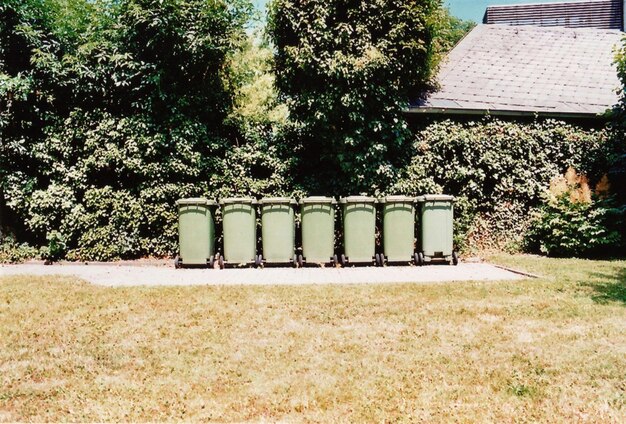
Understand What Can Be Composted
Not all food scraps are suitable for composting. Generally, you can compost fruit and vegetable scraps, coffee grounds, tea bags, eggshells, and yard waste. Avoid composting meat, dairy, and oily foods, as they can attract pests and create unpleasant odors.
Choose a Composting Method
There are several composting methods to choose from, depending on your space and lifestyle. Backyard composting involves creating a compost pile or using a compost bin in your yard. Indoor composting methods include using a vermicomposting system with worms or a bokashi bucket.
- Use a balanced mix of “green” (nitrogen-rich) and “brown” (carbon-rich) materials.
- Turn the compost regularly to aerate it and speed up decomposition.
- Keep the compost moist but not waterlogged.
In summary, composting food scraps is a valuable way to reduce waste and enrich your garden soil. By understanding what can be composted and choosing a suitable composting method, you can turn kitchen scraps into a beneficial soil amendment.
Embrace Meal Planning
Effective meal planning is an essential strategy to reduce food waste, save time, and eat healthier. By spending a little time each week to plan your meals, you can avoid impulse buys and ensure that you only buy what you need.
A well-thought-out meal plan can also help you make better use of ingredients, reduce stress, and improve your overall diet.
Start with Inventory
Before creating your meal plan, take stock of what you already have in your pantry, refrigerator, and freezer. This will help you incorporate existing ingredients into your meals and avoid buying duplicates.
Consider Your Schedule
When planning your meals, consider your weekly schedule and any time constraints. Choose meals that are quick and easy to prepare on busy weeknights, and save more complex recipes for weekends when you have more time.
- Create a flexible meal plan that allows for adjustments based on your schedule and preferences.
- Batch cook certain ingredients or meals in advance to save time during the week.
- Involve family members in the meal planning process to ensure everyone’s needs and preferences are considered.
In conclusion, embracing meal planning is an effective way to reduce food waste. By taking inventory, considering your schedule, and creating a flexible plan, you can ensure that you only buy what you need and make the most out of your groceries.
| Key Point | Brief Description |
|---|---|
| 📝 Meal Planning | Plan meals to buy only what you need, reducing excess waste. |
| 🧊 Proper Storage | Use airtight containers and understand specific food storage needs to extend shelf life. |
| 🔄 Creative Cooking | Transform leftovers into new dishes to avoid them going to waste. |
| 🌱 Composting | Turn food scraps into nutrient-rich soil for your garden. |
FAQ
▼
Reducing food waste is crucial for environmental sustainability, as it minimizes greenhouse gas emissions from landfills and conserves resources used in food production. It also saves money and helps alleviate food insecurity.
▼
You can compost fruit and vegetable scraps, coffee grounds, tea bags, eggshells, and yard waste. Avoid composting meat, dairy, and oily foods, as they can attract pests and cause unpleasant odors.
▼
Meal planning allows you to buy only what you need for the week, reducing the chances of excess ingredients going bad. It also helps you make better use of leftovers and avoid impulse buys.
▼
Store food in airtight containers, separate fruits and vegetables that produce ethylene gas, and keep herbs fresh in a glass of water. Properly storing food extends its shelf life and prevents spoilage.
▼
Transform leftovers into new meals by using leftover roasted chicken in soup or sandwiches, adding cooked vegetables to omelets, or blending leftover fruits and vegetables into smoothies. Get creative and explore new recipes!
Conclusion
By implementing these five smart strategies – adopting smart shopping habits, using effective food storage techniques, engaging in creative cooking with leftovers, composting food scraps, and embracing meal planning – you can significantly reduce food waste, save money, and make a positive impact on the environment. Start today and see the difference you can make!
